Phoresis Read online
Page 10
On the morning of the sixth day, the hard, flat surface of the ice field, compressed by time and worn smooth by wind and dust, began to acquire a smattering of fragile encrustations, shaped more like delicate sculptures than anything that belonged to the realm of geology. Rosalind did her best to avoid them, but as they grew more common she grew impatient with the need to weave a complicated path around them, and started crunching them underfoot.
“Why don’t they just lie flat?” Joanna asked, irritated but still curious. She squatted down to inspect one of the deposits. “You know these things are mostly thin air? They’re like shrubs sprouting ever finer branches, taking up space without actually containing much ice. But I don’t know what makes the ice from the geyser so special that it doesn’t fall straight to the ground.”
Rosalind pondered this. “The ice dust might fall straight to the ground, but if there’s vapor it could condense around whatever’s already there.”
Before long, there was no unencrusted ground remaining; everywhere they trod, ice crumbled beneath their boots. And with each step, they found themselves sinking a little deeper, demolishing ever taller structures before their soles ended up on solid ice and they were left ankle-deep in the surrounding deposits. But then, even more disconcertingly, the lower portions of the ice-shrubs began to resist their weight—with the upper parts still collapsing, leaving them perched on the jagged remnants.
“How did people ever do this, back on Tvíbura?” Joanna wondered.
“What makes you think they were ever stupid enough to try?” The view from on high had been misleading; Rosalind had been prepared to face a craggy landscape built of solid ice, but no amount of rope was going to render this terrain traversable.
“I wouldn’t call it stupid,” Joanna protested. “How could you know there were cracks in the ice going all the way down to the ocean, and not want to take a look? And just because we’re unprepared, it doesn’t mean they were.”
Rosalind could recall children’s stories where people both innocent and wicked had been cast into the chasms by their antagonists. But those tales had been woefully light on detail about the method of approach.
Joanna cried out in pain, and spread her arms to stay balanced as she tried to take the weight off her right foot.
“How bad is it?” Rosalind asked.
“It stabbed through the sole of my boot, but I don’t think it went far into my foot.”
Rosalind pictured the two of them walking with Joanna’s arm across her shoulder; anywhere else it would have been the right thing to do, but here it was only likely to make things worse.
Joanna raised her foot and brought it down again slowly, angled slightly.
“We need to get back on solid ground,” Rosalind said.
“I’m not giving up!” Joanna replied angrily.
“I never said we should. But you need to put a bandage on that. And then we need to find a better route.”
As they were retracing their steps, Rosalind heard the usual rumbling and felt the wind rising up, blowing toward her from the ice field. She turned to see the geyser ascending; they were so close now that the column of white haze blotted out a third of the sky. As she raised her eyes toward the vanishing point, it looked as if the torrent of ice dust was tumbling down, falling toward Tvíbura—as if their dying home was reasserting its power. But Tvíbura had nothing to do with it, and even the sun was cheating: squeezing the trapped, subterranean ocean, raising the pressure in one direction and lowering it another. Down was still down, and no quirk of gravity was going to lift her up off this accursed ground and drag her into the sky.
She looked down again and kept walking gingerly across the perilous surface. After a while, she felt an odd sensation on her skin; she inspected her palms, and saw a faint, branched pattern catch the light. The fine coating of ice cracked and splintered as she flexed her hands. She blinked, and felt the same thing happening on her eyelids.
They set up camp out on the ice field, and Joanna rested her bandaged foot. “I don’t know how long it’s going to take us to learn to repair boots with anything Tvíburian,” she lamented. “Did you see the fabric Hildur wove from tangler fibers? After one day wearing that I think it would take most of your skin off.”
“We’ll learn how to treat the fibers to make them softer,” Rosalind asserted, trying to keep them both optimistic. “And we still haven’t cataloged all the less common plants. Nobody made the plants on Tvíbura for our benefit; we just discovered ways to use them, over time. It will be the same here.”
“Maybe.”
The next morning, they left their tent standing and set off in a broad arc around their target, hoping that a combination of influences—the prevailing winds, the topography of the ice field, and the shape of the chasm itself—might direct the falling plume of ice dust and water vapor in such a manner that a path was left clear. But while the edge of the region plagued by encrustations moved closer to the chasm for a while, it soon reversed direction and forced them away again.
It took them all day to come full circle.
Joanna limped to a halt in front of the tent. “We need to come back with wooden boards we can put under our feet,” she said. “Strapped to our boots, to spread the weight over a larger area.”
Rosalind said nothing, but she suspected that that would just delay the inevitable: they might succeed in crossing more of the fragile ice before it gave way beneath them, but when it happened they would only plunge deeper into the pile of icy spears and blades that the geyser had been stacking up around itself since its inception.
She looked up wearily toward Tvíbura. A lizard was circling overhead; she’d seen so many of them close to the geyser that she was starting to wonder if there was some kind of oceanic insect that they were feeding on—snatching it out of the air as the geyser delivered it, stunned or dead, into this strange, hostile world that the poor creatures could never have imagined existing.
“I know how we can get the root cuttings into the chasm,” she said.
“With my ice shoes,” Joanna replied, puzzled, as if the matter had been settled.
“We saw some cliffs to the north,” Rosalind reminded her. “Not much farther from the geyser than we are now.”
“What has that got to do with anything?”
Rosalind said, “The ground’s not safe to walk on, but the lizards have no trouble with the air here. I’ll glide off the cliffs, and let the updraft carry me over the chasm.”
10
Rosalind took her time, studying the lizards as closely as she could, contemplating the modifications she would need to make to her glider if she wanted to mimic the way they spiraled up around the geyser. Trying to create panels that undulated like the lizards’ membranes would be absurd, but adding a system of struts and levers that allowed her to flex the whole shape slightly, giving it enough asymmetry to force it to swerve left or right, seemed like a reasonable ambition.
She made the changes, then carried her glider to the top of the plateau to test the new design. But as she ran toward the edge, her courage failed her. She stopped and knelt down on the tangler-infested soil, trembling in horror at the risk she’d almost taken. If anything had gone awry, she could have dashed her skull open on the ice below.
She left the glider where it was and made her way carefully down the slope, relieved to have abandoned the whole insanely reckless notion. It was only when she was back on level ground that she paused to reflect on the reasons for her change of heart.
Rosalind stood on the ice for a long time, weighing up her options. Then she went looking for Sigrid.
“I think it’s time,” she told Sigrid. “We know we can survive on the tanglers and the voles. We can feed and shelter ourselves. And we understand the animals here well enough not to fear them. Nothing’s certain, but someone has to be first. And I know you’d make the best mother, out of all of us.”
Sigrid was amused. “If your brothers are annoying you, just say so. You don’
t need to flatter me.”
“But you agree?”
“Yes. When do you want to do this?”
“Tonight,” Rosalind replied. “Up on the plateau, where we’ll have some privacy.”
As the time approached, Rosalind tried to keep her mind on other things. She spent the afternoon helping Hildur with her weaving, then she chatted with her fellow villagers, pursuing every idle topic that arose, prolonging each distraction for as long as she could.
“Are you all right?” Joanna asked her.
“I’m fine.”
“How are your experiments with the glider going?”
Rosalind said, “There are some aspects that are proving trickier than I expected. But I think I can sort them out.”
At sunset, she left the tent on the ice field and headed up the slope. There was a second tent, on the plateau, that had been largely abandoned since their farming experiments had failed. As Rosalind entered, Sigrid called out to her; she had followed close behind.
“Don’t be nervous,” Sigrid told her, as they knelt down together in the near darkness. “Before I joined the expedition, I let one of my brothers breed. It only seemed fair, before they faced the long sleep. And I can promise you, it’s not that difficult. Just relax, and he’ll know what to do.”
They loosened their clothing and brought their bodies together. Rosalind felt all three of her brothers scrambling to take advantage of the opportunity, but the struggle didn’t last long. The winner emerged, protruding from between her legs, crossing the narrow gap between the women, determined to father a child.
Sigrid gasped, but didn’t flinch; she wrapped her arms around Rosalind to keep their bodies from being pushed apart. Rosalind listened carefully to her labored exhalations, trying to judge the progress of the act. She had no experience at all, but she’d heard enough talk from other women to know what to expect.
Sigrid shuddered, then relaxed. Rosalind pulled away from her as quickly as she could, then reached down and took hold of her retreating sibling before he could disappear. She got to her feet, hitching up her trousers with her other hand, and headed out of the tent.
“Are you all right?” Sigrid called after her.
“I’m fine,” she replied. “It’s just the pressure on my bladder…”
Rosalind walked carefully across the uneven soil, afraid of tripping on the tanglers. When she was far enough away from the tent, she knelt down on the ground and groped in her pocket for the knife.
Before her brother could sense what was happening and try to change her mind, she pushed the blade into his body and forced it through to the hilt. He squealed and thrashed, but the handle of the knife was jammed against her thighs, so the more he tried to retreat to safety, the more damage the blade wreaked.
When he stopped moving, Rosalind cut off everything that protruded and buried it in the soil. She was weeping softly, but she hardened her heart. He’d fulfilled his purpose; she’d given him that. She would do the same for the other two.
She had no choice. However repugnant this fratricide, she couldn’t spare them. She had her purpose too.
Once Rosalind had perfected her technique, she demonstrated her modified glider to the rest of the village: launching off the plateau, and completing a rough circle over the ice before landing.
Afterward, they gathered in the tent and she sketched out a plan that she hoped they’d find plausible.
“You’ll start flying while the geyser’s active?” Kate asked, troubled by the notion.
“It’s the only way to get above the chasm,” Rosalind explained. “I need a strong updraft. Even starting from the cliffs, if I tried to approach while the geyser was quiet, I’d just crash into the needle-ice before I was even close.”
“So you approach, you circle around waiting for the geyser to stop, then you swoop over the chasm, drop the root cuttings…and hope you get back to solid ground before you lose altitude?”
“Exactly,” Rosalind agreed. “But when you say ‘hope’ that makes it sound like a huge gamble. I’ll make sure I’m high enough to start with so it won’t be unlikely at all.”
Kate looked dubious. “And when you say ‘I’ll make sure’ that makes it sound as if you’ve done all this a thousand times before.”
Rosalind said, “Either I try it at the real site now, or I give up. I’ve practiced as much as I can.”
They voted in her favor, six to two, with only Kate and Frida unconvinced. Joanna would accompany her, since she knew the terrain already.
As they left the tent, Sigrid touched her shoulder and whispered, “Good news. Your brother should be happy.”
Rosalind said, “We should all be happy.”
“We will be,” Sigrid assured her, “when we see the child born.”
When they set out for the geyser for the second time, Joanna was uncharacteristically subdued. Rosalind wasn’t sure what was troubling her, but after a day walking in near silence, she tried to break the mood.
“Are you annoyed that no one went for your ice shoes?” she teased her.
“Not at all,” Joanna replied. “I’m sure the glider’s a better idea.”
“I’ll be careful,” Rosalind promised. “I know how important this is.”
They were halfway through raising the tent when Rosalind felt a cramp in her abdomen. She excused herself and walked away across the ice, getting as far as she could before the pain stopped her, then arranging her clothes to conceal as much as possible and hoping that it looked like she was defecating. She’d thought her body would expel the dead tissue swiftly, and when it didn’t happen within a day or two she’d wondered if she’d somehow resorbed it. But now all three of the shrivelled roots came out, in a rapid succession of bloody convulsions.
She squatted on the ice, shivering, trying to compose herself. Whatever happened at the geyser, at least one child was coming. She’d have a niece to survive her; she had to take solace from that.
By the time she got back, Joanna had finished with the tent and was lying inside, feigning sleep. Maybe she knew about Sigrid, and Anya, and Sophie, and was hurt that Rosalind hadn’t confided in her. But if they started talking about the subject at all, it might be impossible to stop.
“Sleep well,” Rosalind whispered. She laced up the entrance and lay down on the blanket, hoping they wouldn’t be disturbed by the cats.
They veered north as they approached the geyser, following a gently sloping route to the top of the cliffs. Rosalind kept seeing lizards circling the chasm, and if that in itself promised nothing, at least it was more encouraging than their absence would have been.
“Someone took an awful lot of ink from the stores, just before we left,” Joanna said, apropos of nothing.
“Really?”
“You know how much I use, myself. So I couldn’t help noticing what was missing.”
Rosalind said, “We’ll find a good substitute eventually. The right kind of plant resins, the right kind of minerals…people have just been busy with other things.”
Ahead of them, the geyser erupted into the sky. Joanna stopped. “Do you want me beside you on the cliff, or do you want me to hang back?”
Rosalind didn’t know how to answer that. Joanna walked up and embraced her. “You know it might not work?” she said. “I’ve tried to estimate the velocity, and I think it might be close, but it’s hard to make the measurements precise.”
“I know. But I need to try.”
“Yeah.”
Rosalind tightened her hold on her friend and imagined retreating, the two of them walking back to the village together. Then she released Joanna and stepped away. “You should stay here,” she decided. “Just tell the others I got the cuttings in.”
“All right.”
Rosalind turned and walked up the slope toward the cliff. A dozen or so strides from the edge, she took off her pack and began assembling the glider. When it came to the runners she hesitated, trying to decide between the disadvantage of their weight and the prot
ection they offered. She should have made a judgment on that before she even left the village. But she didn’t have time to agonize; habit took over, and she snapped them into place. The ritual, completed, felt right now.
“Don’t look back,” she muttered. She’d lost track of how far away Joanna was, but if she turned for a last farewell it would only be harder for both of them. She put the cuttings in a pouch tied to her belt, strapped the glider onto her back, then ran toward the edge of the cliff as fast she could.
The wind was already behind her, drawn inward and upward by the geyser’s flow. Her feet were barely touching the ground, and as she stepped off the cliff she ascended. Below her, she saw the fractured cone of uncrossable ice spread out in all its glittering, glorious irrelevance; she hooted down at it with delight and derision.
She looked up into a wall of white haze, and twisted the glider, sending it swerving right. This close, the geyser itself was too wide and diffuse to navigate by; she turned back to the ground, taking her cues from what she could still see of the cone through the ice-dust. She was rising faster than she’d expected; all the rehearsals in her head had played out far more slowly.
The cone disappeared, leaving her engulfed in whiteness everywhere she looked. She sent the glider left, and pictured it ascending in an ever-narrower helix. Was she over the chasm? It was impossible to tell. But if she waited any longer, and rose any higher, it would only increase the chance that anything she dropped would be blown aside on its way down.
She opened the pouch and watched the cuttings tumble away; as strong as the updraft was, they were dense and compact enough for their weight to overcome it. Ice was forming on her hands and face; she wanted to grimace, but she was afraid the fragments would cut her, even blind her.
All that mattered now was gaining speed. The whole flow of the geyser couldn’t escape Tvíburi’s gravity, or there would be no cone of fallen ice around it, and no soil added to any of the plateaus. But that didn’t prove that every last particle the geyser emitted fell back to the ground. She just had to find the fastest portion, emerging from the very center of the chasm where friction with the walls had taken the least toll.

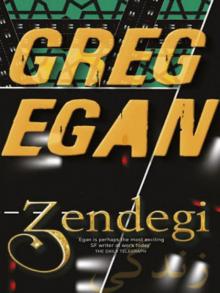 Zendegi
Zendegi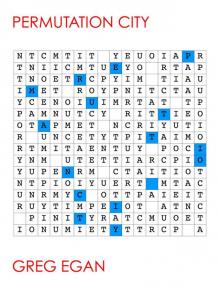 Permutation City
Permutation City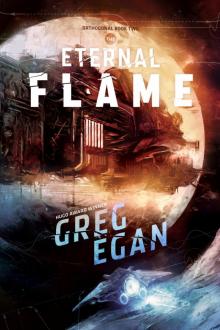 The Eternal Flame
The Eternal Flame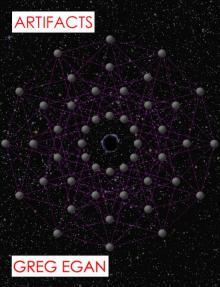 Artifacts
Artifacts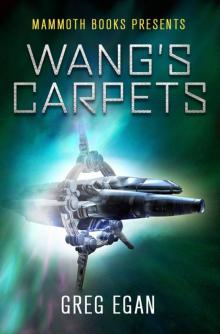 Wang's Carpets
Wang's Carpets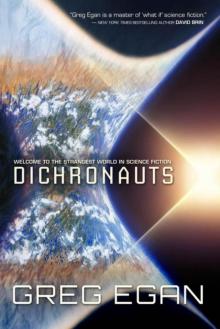 Dichronauts
Dichronauts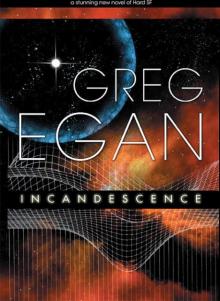 Incandescence
Incandescence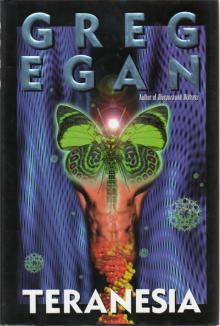 Teranesia
Teranesia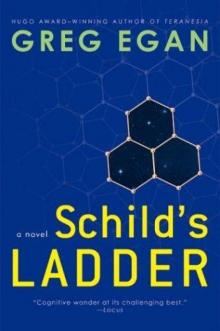 Schild's Ladder
Schild's Ladder Quarantine
Quarantine The Four Thousand, the Eight Hundred
The Four Thousand, the Eight Hundred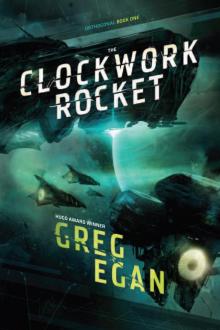 The Clockwork Rocket
The Clockwork Rocket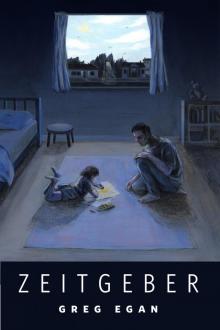 Zeitgeber
Zeitgeber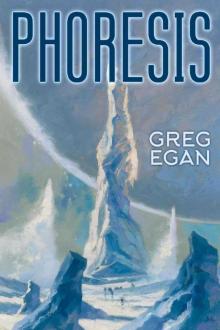 Phoresis
Phoresis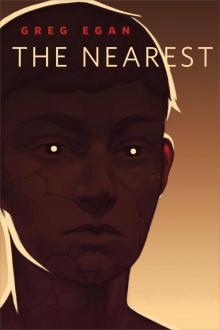 The Nearest
The Nearest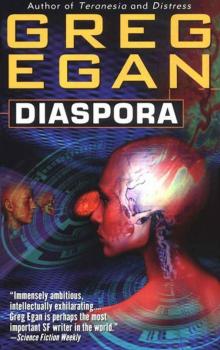 Diaspora
Diaspora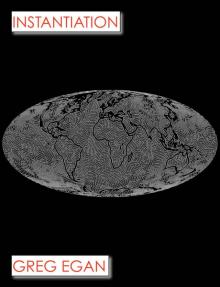 Instantiation
Instantiation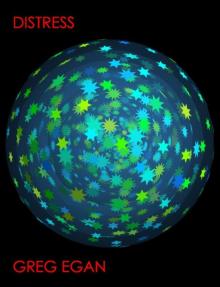 Distress
Distress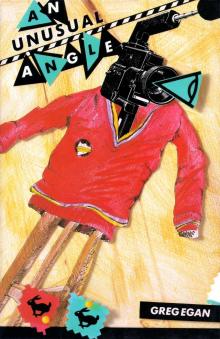 An Unusual Angle
An Unusual Angle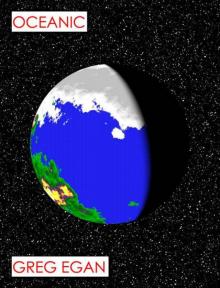 Oceanic
Oceanic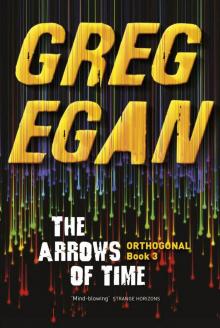 The Arrows of Time
The Arrows of Time Axiomatic
Axiomatic![Anthology 2. Luminous [1998, 2010] Read online](http://i1.bookreadfree.com/i/03/18/anthology_2_luminous_1998_2010_preview.jpg) Anthology 2. Luminous [1998, 2010]
Anthology 2. Luminous [1998, 2010]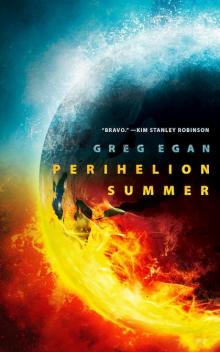 Perihelion Summer
Perihelion Summer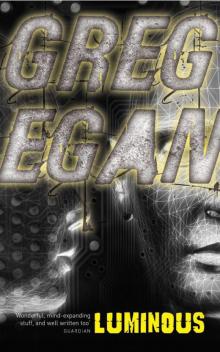 Luminous
Luminous